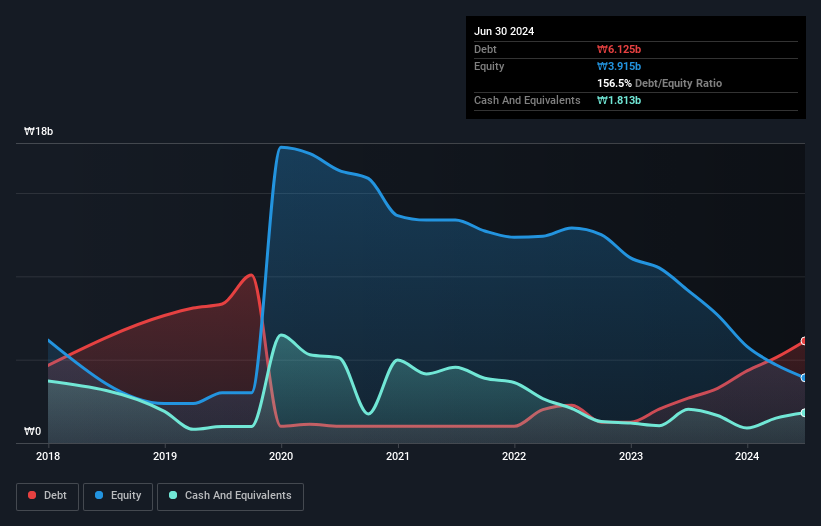- South Korea
- /
- Entertainment
- /
- KOSDAQ:A317530
Does Carriesoft (KOSDAQ:317530) Have A Healthy Balance Sheet?
The external fund manager backed by Berkshire Hathaway's Charlie Munger, Li Lu, makes no bones about it when he says 'The biggest investment risk is not the volatility of prices, but whether you will suffer a permanent loss of capital.' When we think about how risky a company is, we always like to look at its use of debt, since debt overload can lead to ruin. As with many other companies Carriesoft Co., Ltd. (KOSDAQ:317530) makes use of debt. But the real question is whether this debt is making the company risky.
What Risk Does Debt Bring?
Generally speaking, debt only becomes a real problem when a company can't easily pay it off, either by raising capital or with its own cash flow. Ultimately, if the company can't fulfill its legal obligations to repay debt, shareholders could walk away with nothing. While that is not too common, we often do see indebted companies permanently diluting shareholders because lenders force them to raise capital at a distressed price. Having said that, the most common situation is where a company manages its debt reasonably well - and to its own advantage. The first thing to do when considering how much debt a business uses is to look at its cash and debt together.
Check out our latest analysis for Carriesoft
What Is Carriesoft's Debt?
The image below, which you can click on for greater detail, shows that at June 2024 Carriesoft had debt of ₩6.13b, up from ₩2.69b in one year. However, it also had ₩1.81b in cash, and so its net debt is ₩4.31b.

How Healthy Is Carriesoft's Balance Sheet?
The latest balance sheet data shows that Carriesoft had liabilities of ₩8.83b due within a year, and liabilities of ₩724.3m falling due after that. Offsetting these obligations, it had cash of ₩1.81b as well as receivables valued at ₩1.00b due within 12 months. So its liabilities outweigh the sum of its cash and (near-term) receivables by ₩6.74b.
While this might seem like a lot, it is not so bad since Carriesoft has a market capitalization of ₩28.1b, and so it could probably strengthen its balance sheet by raising capital if it needed to. But we definitely want to keep our eyes open to indications that its debt is bringing too much risk. When analysing debt levels, the balance sheet is the obvious place to start. But it is Carriesoft's earnings that will influence how the balance sheet holds up in the future. So if you're keen to discover more about its earnings, it might be worth checking out this graph of its long term earnings trend.
Over 12 months, Carriesoft made a loss at the EBIT level, and saw its revenue drop to ₩6.2b, which is a fall of 37%. That makes us nervous, to say the least.
Caveat Emptor
Not only did Carriesoft's revenue slip over the last twelve months, but it also produced negative earnings before interest and tax (EBIT). Indeed, it lost a very considerable ₩4.8b at the EBIT level. When we look at that and recall the liabilities on its balance sheet, relative to cash, it seems unwise to us for the company to have any debt. So we think its balance sheet is a little strained, though not beyond repair. Another cause for caution is that is bled ₩2.5b in negative free cash flow over the last twelve months. So in short it's a really risky stock. The balance sheet is clearly the area to focus on when you are analysing debt. However, not all investment risk resides within the balance sheet - far from it. Case in point: We've spotted 4 warning signs for Carriesoft you should be aware of, and 2 of them are a bit unpleasant.
If you're interested in investing in businesses that can grow profits without the burden of debt, then check out this free list of growing businesses that have net cash on the balance sheet.
New: AI Stock Screener & Alerts
Our new AI Stock Screener scans the market every day to uncover opportunities.
• Dividend Powerhouses (3%+ Yield)
• Undervalued Small Caps with Insider Buying
• High growth Tech and AI Companies
Or build your own from over 50 metrics.
Have feedback on this article? Concerned about the content? Get in touch with us directly. Alternatively, email editorial-team (at) simplywallst.com.
This article by Simply Wall St is general in nature. We provide commentary based on historical data and analyst forecasts only using an unbiased methodology and our articles are not intended to be financial advice. It does not constitute a recommendation to buy or sell any stock, and does not take account of your objectives, or your financial situation. We aim to bring you long-term focused analysis driven by fundamental data. Note that our analysis may not factor in the latest price-sensitive company announcements or qualitative material. Simply Wall St has no position in any stocks mentioned.
About KOSDAQ:A317530
Carriesoft
Carriesoft Co., Ltd. creates and publishes contents for kids and family worldwide.
Moderate risk with worrying balance sheet.
Market Insights
Community Narratives



